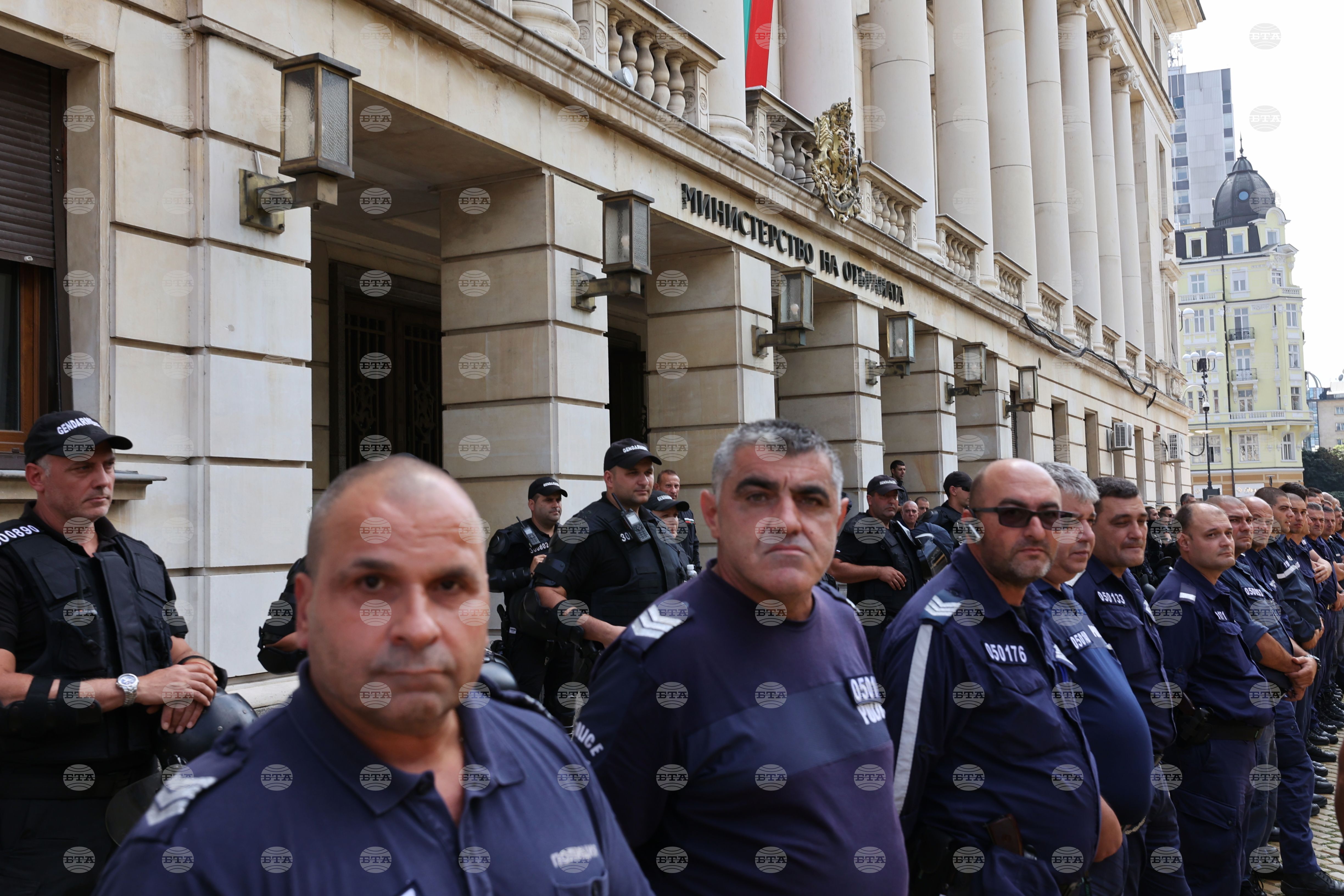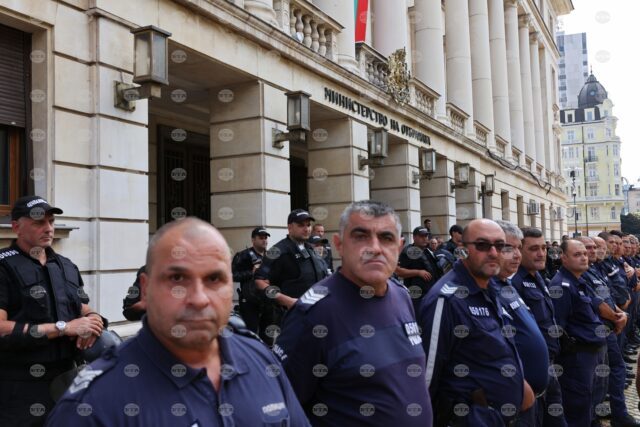
The record increase in personnel costs in the state budget over the past two years is emerging as a serious challenge for the 2026 state budget, the Fiscal Council said. The institution analyzed the structure of personnel expenditure by sectors and proposed several options for optimization.
One of its main recommendations is reducing the size of municipal administrations through mergers of municipalities. The shrinking population makes the administrative burden on small municipalities unsustainable. Despite the demographic decline, the number of administrative employees is not decreasing – in fact, it has grown to 35,000, the Fiscal Council underscored.
Another recommendation is to optimize the number of police officers, which continues to grow even as the population declines. According to the latest data from the National Statistical Institute (NSI), there were 421 police officers per 100,000 people in 2022, compared to 312 in 2015 – the latter being the EU average. In terms of spending on the Public Order and Security sector, Bulgaria ranks among the top in the EU – 2.7% of GDP, compared to the EU average of 1.7% of GDP.
The Fiscal Council also recommends that civil servants and police officers pay their own social security contributions, as all other employees do.
According to the Council’s analysis, the current public sector pay policy should be reconsidered for several reasons: personnel costs have become excessively large (10% of GDP); wage growth exceeding inflation stimulates consumption and generates additional inflation; rising wages in the public sector force private employers to raise pay as well; prioritizing pay rises in certain sectors creates a sense of unfairness and triggers demands for higher wages in others; the declining population requires staff reductions in sectors where workload is falling (such as police, teachers, doctors, and civil servants); and the rules for splitting social security contributions between employer and employee should be uniform for all workers.
State personnel costs — employment and wages by sector
Personnel costs in the 2024 state budget report amounted to over BGN 20 billion, compared with BGN 18 billion planned. Of these, BGN 16 billion went to wages and the remaining BGN 4 billion to social security contributions, an increase of BGN 3 billion, or 17%, year-on-year. For 2025, personnel costs were planned at BGN 22.8 billion, again nearly BGN 3 billion higher. Personnel expenditure accounts for 26% of all government spending (22% in 2018) and has reached 10% of GDP, compared to below 8% in 2018. These data show that over the past five to six years, public personnel costs have been growing faster than inflation, the analysis said.
The number of people employed in the public sector under labour or service contracts in 2024 was 558,399. The largest share (around 28%) work in education, followed by healthcare (24%) and the state administration (20%, or 112,700 employees). These three sectors together account for roughly 72% of total wage costs. The analysis of employment trends shows a notable increase in healthcare employment — from 101,000 people in 2019 to 132,000 in 2024. This sector also recorded the largest rise in wage spending — from BGN 1.7 billion in 2020 to BGN 3.4 billion in 2024.
The average gross monthly wage in the public sector in 2024 was BGN 2,400 — up 15% from the previous year. Pay has risen at a similar pace in the three largest sectors. Public sector wages now exceed those in the private sector, where the average is BGN 2,300. The Fiscal Council underscored that the public pay policy exerts pressure on the labour market, forcing private employers to raise wages to retain staff. In many municipalities, most employees work in the public sector, which effectively sets the benchmark for local wage levels that private employers must match.
The 2024 budget report recorded BGN 2.2 billion more in personnel costs than planned — a 12% overspent. This overspending is not linked to the central government budget but likely to municipal budgets, where personnel costs reached BGN 8.12 billion (compared with BGN 6.85 billion in 2023). Much of this spending is financed by transfers from the state budget for delegated activities, mainly in education, the analysis further explained.
Public administration
As of June 2025, the executive branch employed 99,000 people — some 35,000 in municipal administrations and another 56,000 in central administration. Between 2011 and June 2025, the total headcount in the executive branch increased moderately by 2,623 employees. Over the same period, the ratio of population per administrative employee fell from 76.1 to 65.1, according to Fiscal Council calculations, indicating a slight increase in administrative burden, mostly due to population decline.
Municipal administrations have grown the fastest — by 2,184 employees between 2011 and June 2025. The ratio of population per municipal employee dropped from 223.2 in 2011 to 183.9 in June 2025, marking a significant increase in administrative load. The Fiscal Council suggested that an administrative reform should be considered to reduce the number of municipalities, as in many smaller ones the administrative burden has become excessively high.
Public order and security
Bulgaria’s spending on Public Order and Security as a share of GDP is among the highest in the EU — 2.6%, compared with the EU and euro area average of 1.7%, according to Eurostat (2023). Spending on Justice is also the highest in the EU — 0.7% of GDP, compared with 0.3% for the EU average, followed by Police at 1.3% (0.9% for the EU). According to the 2024 state budget report, spending on Public Order and Security was 2.76% of GDP, while defence accounted for 1.6%.
In the 2025 budget, personnel spending in the Interior Ministry and other security agencies rose sharply. Despite the high spending, public trust in the system continues to decline. The number of police officers per capita has increased even as the population falls. In 2022, Bulgaria had 421 police officers per 100,000 people (28,800 officers), compared with 312 (22,465 officers) in 2015 — a 28% rise in seven years. The 312-per-100,000 ratio is close to the EU average (313) and slightly above the global average of 300 (UN, 2006). As of June 30, the Interior Ministry had 55,000 budgeted positions, of which 5,700 were vacant (including 27,000 in regional directorates, 8,700 in Fire Safety, and 8,700 in Border Police). The Fiscal Council highlighted a sharp imbalance between staffing levels and crime rates, suggesting the need for regional optimization, particularly in Smolyan, Kardzhali, Varna, and Plovdiv.
Social and health insurance contributions
The social insurance contributions paid by the state and municipalities amount to BGN 4.3 billion (BGN 2.6 billion from the state and BGN 1.35 billion from municipalities). In 2024, there were 48,280 civil servants in the most common third labour category, with an average monthly insurable income of BGN 2,432. The state fully covers their health and social insurance contributions (24.3% for social insurance and 8% for health), while other employees pay 13.78% from their own income. This privilege dates back to a time when civil servants were poorly paid. Today, however, it is seen as unfair to other public and private sector employees.
Total insurance contributions paid by the state for civil servants, including those in the judiciary (excluding Interior Ministry staff), amount to BGN 385 million. The fiscal effect on the budget would be a reduction of about BGN 200 million in contributions, the analysis said. According to the Fiscal Council, a much greater fiscal effect would be achieved if police and military personnel also paid part of their own contributions, as other employees do — currently, the state covers 73.3% of their insurance. There is no economic logic in some employees paying personal contributions while others do not. Moreover, since they accrue insurance rights, their contributions are effectively paid by the state — i.e. by taxpayers, the Fiscal Council emphasized.
Record-High Public Sector Payroll Costs Pose Major Risk for 2026 Budget, Fiscal Council Warns THE NEWS FROM BULGARIA – NEWS AGENCY 2009-2025 2025-10-28 12:39:50 Latest news World news Country news Most important news latest news most important latest of the day Justice Petar Nizamov Feathers Petar Nizamov- Feathers Justice bg iustitia.bg iustitia iusticia usticia investigation Burgas Bulgaria news news of the last hour news of the day news of today Bulgaria news The news from Bulgaria blitz news top news most important most commented latest news Boyko Borisov news weather coronavirus news news weather facebook youtube facebook instagram news today news of the last minutes news today today news news bg news leading news hot news bg news site for news all news news bg news of the last hour latest latest news bg news of today news today news today news of the last hour latest news today news bg news news 24 hours news vesti bg novini news world bird bg bivol bg bivol trud bg novini latest news today novinite bg news hello bulgaria political party coat of arms delyan peevski scandalous Bulgarian National Television Free Europe Television scandal exclusive live tv live right now tv tv online tv program bg live now tv news online tv online live court Burgas court Burgas district court Burgas court Burgas district court Burgas district court Burgas appellate court Burgas prosecutor Burgas prosecutor’s office Burgas district prosecutor’s office Burgas district prosecutor’s office Burgas district prosecutor’s office Burgas district prosecutor’s office Burgas district prosecutor’s office Burgas district prosecutor’s office Prosecutor General Ivan Geshev Prosecutor Geshev Tsatsarov Ministry of Internal Affairs Burgas ODMR Burgas ODPR Burgas police Burgas district police Burgas prosecutor Tsatsarov SGS cases Varna court chairman of the SGS court decisions on civil cases decisions on cases Plovdiv court decision of the court decisions cases Varna court criminal cases district district court decisions work in the court SGS chairman of the SGS judges Sofia court post judges Plovdiv court Plovdiv judges Plovdiv Supreme Court Inspectorate Supreme Court Supreme Judicial Council lawyer lawyer criminal cases lawyer civil cases lawyer marriage cases lawyer administrative criminal law criminal process civil law civil process administrative law constitutional law















